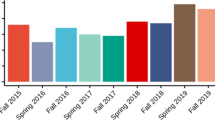Abstract
There is strong evidence that dishonesty occurs amongst medical students, and other allied health students and growing evidence that it occurs amongst medical academics. We believe that accidental dishonesty (or not knowing about the rules of regulations governing academic integrity) is a common attribution describing engagement in dishonesty; however, we believe that dishonest action is more often influenced and determined according to circumstance. In this paper, we aim to work through the literature that frames dishonest action with a focus on medical education, research and publication. We argue that the implications for medical education are far reaching and the root causes of many instances of dishonesty need to be more fully understood so that comprehensive, case-by-case ameliorative strategies can be developed.

Similar content being viewed by others
References
Abaraogu UO, Henning MA, Okpara MC, Rajput V. Disclosing academic dishonesty: perspectives from Nigerian and New Zealand health professional students. Ethics Behav. 2016;26(5):431–47.
Bilić-Zulle L, Frković V, Turk T, Ažman J, Petrovečki M. Prevalence of plagiarism among medical students. Croat Med J.2005;46(1):129–131.
Cole AF. Plagiarism in graduate medical education. Fam Med: Kansas City. 2007;39(6):436.
Kusnoor AV, Falik R. Cheating in medical school: the unacknowledged ailment. South Med J. 2013;106(8):479–83.
Hrabak M, Vujaklija A, Vodopivec I, Hren D, Marušić M, Marušić A. Academic misconduct among medical students in a post-communist country. Med Educ. 2004;38(3):276–85.
Baldwin D Jr, Daugherty SR, Rowley BD, Schwarz M. Cheating in medical school: a survey of second-year students at 31 schools. Acad Med. 1996;71(3):267–73.
Henning MA, Malpas P, Manalo E, Ram S, Vijayakumar V, Hawken SJ. Ethical learning experiences and engagement in academic dishonesty: a study of Asian and European pharmacy and medical students in New Zealand. Asia Pac Educ Res. 2015;24(1):201–9.
Tanner CA. Moral decline or pragmatic decision making? Cheating and plagiarism in perspective. J Nurs Educ. 2004;43(7):291–2.
Coverdale J, Henning MA. Cheating by Medical Students. Royal Australian and New Zealand Conference of Psychiatrists, Hamilton, New Zealand; September 2nd to 4th., 1998.
Lacasse JR, Leo J. Ghostwriting at elite academic medical centers in the United States. PLoS Med. 2010;7(2):e1000230.
Sierles F, Hendrickx I. Cheating in medical school. Acad Med. 1980;55(2):124–5.
Shafer SL. Plagiarism is ubiquitous. Anesth Analg. 2016;122(6):1776–80.
Pincus HS, Schmelkin LP. Faculty perceptions of academic dishonesty: a multidimensional scaling analysis. J High Educ. 2003;74(2):196–209.
Nabi J-u. Scientific misconduct: a brief introduction to its various aspects. Science Vision. 2014;20(1):1–6.
Chapman DW, Lindner S. Degrees of integrity: the threat of corruption in higher education. Stud High Educ. 2016;41(2):247–68.
Henning MA, Ram S, Malpas P, Shulruf B, Kelly F, Hawken SJ. Academic dishonesty and ethical reasoning: pharmacy and medical school students in New Zealand. Med Teach. 2013;35(6):e1211–7 http://informahealthcare.com/doi/pdf/10.3109/0142159X.2012.737962. Accessed 5 Nov 2018
Coverdale J, Henning MA. An analysis of cheating behaviours during training by medical students. Med Teach. 2000;22(6):582–6.
Lines L. Ghostwriters guaranteeing grades? The quality of online ghostwriting services available to tertiary students in Australia. Teach High Educ. 2016;21(8):889–914.
Academic Ghostwriting Services. Academic Ghostwriting. https://www.academicghostwriting.com/services/academic-ghost-writing/. Accessed 25 May 2018.
Belluz J. The murky world of academic ghostwriting. Maclean’s. 2011(May 6). https://www.macleans.ca/society/technology/the-murky-world-of-academic-ghostwriting/. Accessed 5 Nov 2018
Bretag T. Challenges in addressing plagiarism in education. PLoS Med. 2013;10(12):e1001574.
Bird SJ. Self-plagiarism and dual and redundant publications: what is the problem? Sci Eng Ethics. 2002;8(4):543–4.
Henning MA, Malpas P, Manalo E, Ram S, Vijayakumar V, Hawken SJ. Ethical learning experiences and academic dishonesty: a study of Asian and European pharmacy and medical students in New Zealand. Asia Pac Educ Res. 2015;24(1):201–9.
Henning MA, Malpas P, Ram S, Doherty I, Kelly F, Hawken SJ. Can engagement in academic dishonesty be described as planned behaviour or lack of self-control? Pharm Educ. 2011;11(1):158–65.
Henning MA, Ram S, Malpas P, Sisley R, Thompson A, Hawken SJ. Reasons for academic honesty and dishonesty with solutions: a study of pharmacy and medical students in New Zealand. J Med Ethics. 2014;40:702–9.
Stimmel B, Yens D. Cheating by medical students on examinations. Am J Med. 1982;73(2):160–4.
Tonkin AL. “Lifting the carpet” on cheating in medical school exams. BMJ. 2015;351. https://doi.org/10.1136/bmj.h4014
Dans PE. Self-reported cheating by students at one medical school. Acad Med. 1996;71(1):S70–2.
Tabsh SW, Abdelfatah AS, El Kadi HA. Engineering students and faculty perceptions of academic dishonesty. Qual Assur Educ. 2017;25(4):378–93.
Broeckelman-Post MA. Building a culture of academic integrity: the role of communication in creating and changing understandings and enactments of academic integrity. Ohio University; 2009.
Aronson J. Plagiarism–please don’t copy. Br J Clin Pharmacol. 2007;64(4):403–5.
Bretag T, Carapiet S. A preliminary study to identify the extent of self-plagiarism in Australian academic research. Vol 2: Plagiary; 2007.
Wise J. Boldt: the great pretender. BMJ. 2013;346:f1738.
Henning MA, Chen Y, Hawken SJ. Does student engagement in academic dishonesty suggest a lack of self-control? In: Saunders C, editor. Psychology of self-control: new research. New York: Nova Science Publishers, Inc; 2016. p. 15–32.
McCabe DL, Trevino LK. Academic dishonesty: honor codes and other contextual influences. J High Educ. 1993;64(5):522–38.
University of Iowa Carver College of Medicine. Honor Code. 2018; https://medicine.uiowa.edu/md/student-support/student-handbook/honor-code. Accessed 9 Feb 2018.
Gibbs P. Higher education as a market: a problem or solution? Stud High Educ. 2001;26(1):85–94.
Author information
Authors and Affiliations
Corresponding author
Ethics declarations
Conflict of Interest
The authors declare that they have no conflict of interest.
Additional information
Publisher’s Note
Springer Nature remains neutral with regard to jurisdictional claims in published maps and institutional affiliations.
Rights and permissions
About this article
Cite this article
Henning, M.A., Chen, Y., Ram, S. et al. Describing the Attributional Nature of Academic Dishonesty. Med.Sci.Educ. 29, 577–581 (2019). https://doi.org/10.1007/s40670-019-00710-8
Published:
Issue Date:
DOI: https://doi.org/10.1007/s40670-019-00710-8




